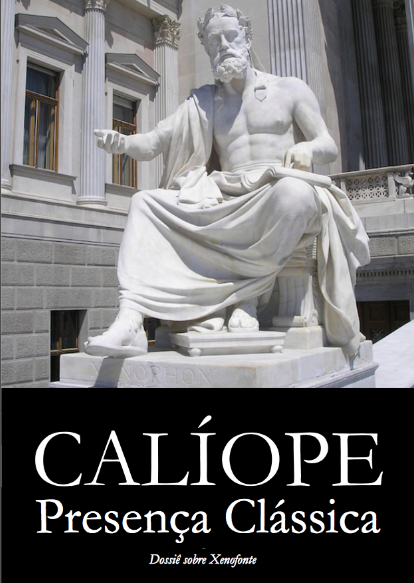Agesilau, um rei em três tempos
DOI:
https://doi.org/10.17074/cpc.v1i41.37470Palavras-chave:
termo 1, termo 2Resumo
O objetivo deste artigo é discorrer sobre a obra de Xenofonte, dedicada ao rei espartano Agesilau, e cotejá-lo com as biografias escritas por Cornélio Nepos e Plutarco, a fim de analisar como se deu a recepção de sua obra nos autores citados.
Referências
Referências
Edições e traduções
CORNELIUS NEPOS. On Great Generals. On Historians. Translated by John C. Rolf. Cambridge: Harvard University Press, 1984. (Loeb Classical Library, 467).
DIOGENES LAERTIUS. Lives of Eminent Philosophers. Translated by Robert D. Hicks. Cambridge: Harvard University Press, v. 1, 2003. (Loeb Classical Library, 184).
HERODOTUS. The Persian Wars. Translated by Anthony D. Godley. Cambridge: Harvard University Press, v. 3, 1986. (Loeb Classical Library, 119).
PLUTARCH. Lives. Agesilaus and Pompey. Pelopidas and Marcellus. Translated by Bernadotte Perrin. Cambridge: Harvard University Press, v. 5, 2004. (Loeb Classical Library, 87).
PLUTARCH. Lives. Theseus and Romulus. Lycurgus and Numa. Solon and Publicola. Translated by Bernadotte Perrin. Cambridge: Harvard University Press, v. 1, 2005. (Loeb Classical Library, 46).
PLUTARCH. Moralia. Precepts of Statecraft. Translated by Harold North Fowler. Cambridge: Harvard University Press, v. 10, 2002. (Loeb Classical Library, 321).
XÉNOPHON. Constituition des Lacédémoniens. Agélisas – Hiéron. Suivi de Pseudo-Xénophon. Constituition des Athéniens. Traduit par Michel Casevitz. Paris: Les Belles Lettres, 2008.
XÉNOPHON. Helléniques. Texte établi et traduit par Jean Hatzfeld. Paris: Les Belles Lettres, t. 1, 1936.
Artigos, livros e capítulos de livro
BENEKER, Jeffrey. Nepos' Biographical Method in the Lives of Foreign Generals. The Classical Journal, Northfield, v. 105, n. 2, p. 109-121, 2009.
BRESSON, Alain. Un “Athénien” à Sparte ou Plutarque lecteur de Xénophon. Revue des Études Grecques, Paris, v. 115, n. 1, p. 22-57, 2002.
CARTLEDGE, Paul. Agesilaos and the crisis of Sparta. London: Duckworth, 1987.
CHRISTESEN, Paul. Xenophon’s views on Sparta. In: FLOWER, Michael A. The Cambridge companion to Xenophon. New Jersey: Princeton University Press, 2017, p. 376-400.
DE BRAUW, Michael. The parts of the Speech. In: WORTHINGTON, Ian. A companion to Greek rhetoric. Malden: Blackwell, 2007, p. 187-202.
FLOWER, Michael A. (ed.) The Cambridge companion to Xenophon. New Jersey: Princeton University Press, 2017.
GEIGER, Joseph. Cicero and Nepos. Latomus, Bruxelles, t. 44, fasc. 2, p. 261-270, 1985.
HAMILTON, Charles D. Agesilaus and the failure of Spartan hegemony. Ithaca/London: Cornell University Press, 1991.
HODBEN, Fiona; TUPLIN, Christopher (eds.) Xenophon: ethical principles and historical inquiry. Leiden/Boston: Brill, 2012.
LEE, John W. Xenophon and his Times. In: FLOWER, Michael A. (ed.) The Cambridge companion to Xenophon. New Jersey: Princeton University Press, 2017, p. 15-36.
PEPE, Cristina. The genres of rhetorical speeches in Greek and Roman antiquity. Leiden/Boston: Brill, 2013.
PERNOT, Laurent. La rhétorique de l’éloge dans le monde gréco-romain. Paris: Institut d’Études Augustiniennes, t. 1, 1993.
PERNOT, Laurent. Rhetoric in Antiquity. Translated by W. E. Higgins. Washington: The Catholic University of America Press, 2005.
SANSONE, David. Agesilaus and the case of the Lame dancer. Illinois Classical Studies, Illinois, n. 37, p. 75-96, 2012.
SCHMIDT, Thomas S. “Plutarque, les Préceptes politiques et le récit des Guerres médiques”. Cahiers des études anciennes, Ottawa, v. 46, p. 101-128, 2009.
SILVA, Maria Aparecida de Oliveira. Plutarco historiador: análise das biografias espartanas. São Paulo: Edusp, 2006.
SMITH, Daniel L. The rhetoric of interruption: speech-making, turn-taking, and rule-breaking in Luke-acts and Ancient Greek narrative. Berlin: Gruyter, 2012.
STADTER, Philip. ‘Staying up late’: Plutarch’s reading of Xenophon. In: HODBEN, Fiona; TUPLIN, Christopher (eds.) Xenophon: ethical principles and historical inquiry. Leiden/Boston: Brill, 2012, p. 43-62.
STEM, Rex. Idealizing a Life of Friendship: Cicero's De Amicitia in Nepos's Life of Atticus. Transactions of the American Philological Association, Baltimore, v. 149, n. 1, p. 27-45, 2019.
TITCHENER, Frances. Cornelius Nepos and the Biographical Tradition. Greece & Rome, New York, v. 50, n. 1, p. 85-99, 2003.
WORTHINGTON, Ian (ed.) A companion to Greek rhetoric. Malden: Blackwell, 2007.
Downloads
Publicado
Edição
Seção
Licença
Autores que publicam nesta revista concordam com os seguintes termos:
Autores mantém os direitos autorais e concedem à revista o direito de primeira publicação, com o trabalho simultaneamente licenciado sob a Licença Creative Commons Attribution que permite o compartilhamento do trabalho com reconhecimento da autoria e publicação inicial nesta revista.
Autores têm autorização para assumir contratos adicionais separadamente, para distribuição não-exclusiva da versão do trabalho publicada nesta revista (ex.: publicar em repositório institucional ou como capítulo de livro), com reconhecimento de autoria e publicação inicial nesta revista.
Autores têm permissão e são estimulados a publicar e distribuir seu trabalho online (ex.: em repositórios institucionais ou na sua página pessoal) a qualquer ponto antes ou durante o processo editorial, já que isso pode gerar alterações produtivas, bem como aumentar o impacto e a citação do trabalho publicado (Veja O Efeito do Acesso Livre).


